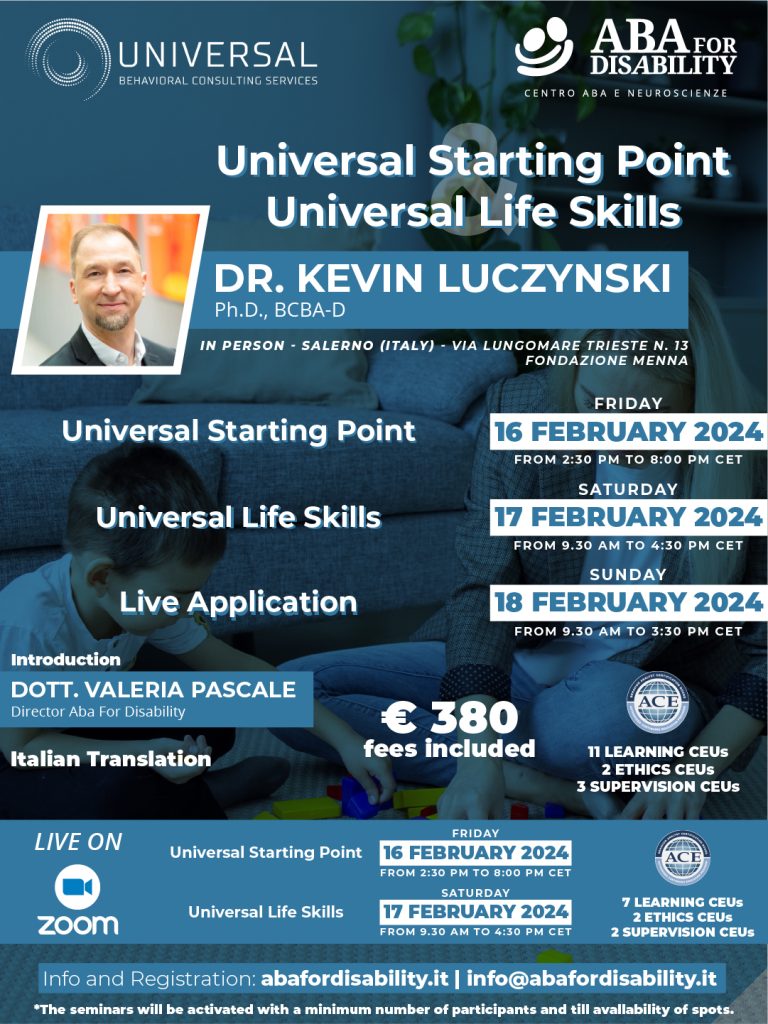Dr. Kevin Luczynski
Universal Starting Point and Universal Life Skills
IN PERSON |16-17-18 February 2024 – Salerno (Italy) – Via Lungomare Trieste n. 13 – Fondazione Menna
ONLINE |16-17 February 2024 – No Live Application

*The seminars will be activated with a minimum number of participants and till availability of spots.
**The online course will only include the two days of universal protocol and universal life skills training, scheduled for Friday 16th and Saturday 17th February 2024.
UNIVERSAL STARTING POINT and UNIVERSAL LIFE SKILLS
16-17-18 FEBRUARY 2024
Speaker: Dr. Kevin Luczynski – Ph.D., BCBA-D
Introduction: Dott. Valeria Pascale – Director ABA for Disability
Cost:
€ 380,00 fees included.
IN PERSON
Program:
Friday February 16 2024 | From 2:30 PM to 8:00 PM CET
Universal Starting Point
Saturday February 17 2024 | From 9:30 AM to 4:30 PM CET
Universal Life Skills
Sunday February 18 2024 | From 9:30 AM to 3:30 PM CET
Live Application
CEUs:
11 Learning CEUs, 2 Ethics CEUs, 3 Supervision CEUs.
ONLINE
Program:
Friday February 16 2024 | From 2:30 PM to 8:00 PM CET
Universal Starting Point
Saturday February 17 2024 | From 9:30 AM to 4:30 PM CET
Universal Life Skills
IMPORTANT: The online course will only include the two days of universal protocol and universal life skills training, scheduled for Friday 16th and Saturday 17th February 2024.
CEUs:
7 Learning CEUs, 2 Ethics CEUs, 2 Supervision CEUs.
Italian Translation.
PROGRAM
Friday February 16 2024 - Universal Starting Point
From 2:30 PM to 8:00 PM CET
The Universal Starting Point program empowers adults to build rapport with every learner through a strength-based approach that addresses challenging behavior
This research-backed approach provides guidance on connecting with learners through fun and then gradually promoting communication, accepting disappointment, waiting by cooperating, & waiting by self-entertaining in a 1-on-1 teaching format.
Professional analysts, educators, and parents will gain confidence in supporting neurodiverse learners through a positive, learner-led approach toward achieving meaningful outcomes.
Where?
- Home with parent.
- School with teacher.
- Clinic with professional Personalized Teaching.
Who?
Neurodiverse learners
- 1 – 11 years old Neurotypical learners.
- 1 – 7 years old.
Mission
- Address Challenging Behavior.
- Meaningful Improvements.
- Promote Communication, Toleration, Cooperating, & Self-Control.
Saturday February 17 2024 - Universal Life Skills
From 9:30 AM to 4:30 PM CET
The Universal Life Skills program is an approach to teaching social skills that prevents the development of severe challenging behavior, promotes behavioral readiness with common expectations at school and home, and fosters initial prosocial interactions with peers through teaching in small group format and incidentally throughout the day.
These social-emotional skills have been identified by teachers as being critical to early school success.
The program offers structured small-group teaching activities, as well as incidental teaching opportunities, to establish the 15 skills. This gradual, sequential approach helps build confidence and comfort in adults, teachers, and students.
The program is often individualized for learners of different abilities, and there is an emphasis on peer-to-peer skills.
Where?
Small-Group & Incidental Teaching Formats.
- With siblings at home.
- Peers at school.
- Social-skills group at clinic.
- Peer-to-peer interactions
Who?
Neurodiverse learners
- 2 – 9 years old Neurotypical learners.
- 2 – 6 years old.
Mission
- Prevent Challenging Behavior.
- Promote Universal Prosocial Skills.
- Promote Peer-to-Peer Kindness.
Sunday February 18 2024 - Live Application
From 9:30 AM to 3:30 PM CET
Unique opportunity to observe Dr. Kevin Luczynski implement the Universal Starting Point and Universal Life Skills program live (in real time). Dr. Luczynski will also provide live support to clinicians implementing the approaches.
Dr Kevin Luczynski, Ph.D., BCBA-D
Dr. Luczynski is a Board Certified Behavior Analyst and a scientist-practitioner who has contributed to research and clinical practice in applying the science of behavior analysis to promote the prosocial development of neurodiverse and neurotypical learners.
He has treated learners who exhibited severe program behavior on the Neurobehavioral Unit at the Kennedy Krieger Institute, a partner with Johns Hopkins Medicine, and concurrently earned his master’s degree at the University of Maryland, Baltimore County (2004-2006). He served as a teacher in the Edna A. Hill Child Development Center at the University of Kansas and as a consultant with Head Start classrooms in Springfield, Massachusetts, where he earned his doctoral degree under the mentorship of Dr. Gregory Hanley at Western New England University (2007-2011). During this time, he also delivered early intensive behavioral intervention to school-aged children at the New England Center for Children. Over the last decade, he developed a telehealth program and prosocial interactions program at the University of Nebraska Medical Center’s Munroe-Meyer Institute, where he mentored 11 doctoral students (2012-2022).
Dr. Luczynski has over 30 publications, and several have been selected by the Associate Editors to serve as the lead article in publication issues. Of note, nearly all of his research has been published in the flagship applied journal in the field, the Journal of Applied Behavior Analysis. He has also served as a Guest Associate Editor for numerous manuscripts submitted to the Journal of Applied Behavior Analysis and as a reviewer for 15 other journals.
Dr. Luczynski has broadened his professional mission so he can inspire and coach others through consultation with how to be comfortable and confident in implementing universal values, procedures, and skills so that meaningful improvements can be achieved in the lives of neurotypical and neurodiverse learners.
Web Links: Google Scholar Profile: https://scholar.google.com/citations?user=2ydD_ZwAAAAJ&hl=en
